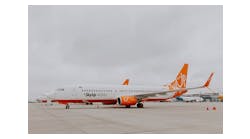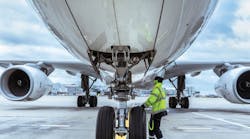For the few people who are flying from Pittsburgh International Airport these days, there will be a new requirement come Monday — they will have to wear a face covering while inside the terminal.
The announcement came the same day that the damage COVID-19 has inflicted on travel revealed itself in one stark statistic — passenger traffic at the Findlay airport plunged a whopping 96% in April.
Requiring face coverings for all of those who work at or fly from the airport is part of a broader effort to instill confidence in the public that travel is safe, said Christina Cassotis, CEO of the Allegheny County Airport Authority, which operates Pittsburgh International.
She noted that many people already are wearing masks at the airport and that nearly all airlines are requiring them at this point. So she doesn’t see it as a big issue.
“This won’t be much of a change,” she said.
If someone comes into the terminal without a face covering, that person will not be kicked out. “We’re going to alert them as to where they can purchase one and ask them to please put it on,” Ms. Cassotis said.
The requirement regarding face coverings is just one of the steps that the airport is taking to combat COVID-19.
It has deployed two robotic floor-cleaning scrubbers equipped with ultraviolet light disinfection technology in the terminal. It also has been experimenting with the same technology to clean handrails, the tram, restrooms, elevators and other high-touch areas.
In addition, the airport has been installing plexiglass shields at public counters, the security checkpoints, baggage claim, and other locations. Signage and floor markings are being put in place to keep people six feet apart and furniture in gate areas, the food court, and baggage claim are being removed or repositioned for social distancing.
“We’re focusing on what we can control,” Ms. Cassotis said.
The safety measures come amid more grim news for the airport in terms of passenger traffic.
During a presentation to the airport authority board Friday, Ms. Cassotis delivered one piece of bad news after another as she recounted the toll the pandemic had taken — the most striking being the 96% free fall.
“To put this in perspective, we handled about the same number of passengers in the month of April as we would typically handle in one busy summer day,” she said.
Year to date through April, traffic is down 39.1%, yet another reflection of the hit the virus had delivered.
Furthermore, the number of available seats offered last month by the airlines flying from Pittsburgh dropped 48.1% as carriers slashed flights because of the weak demand. Before the pandemic emerged, the airport had been projecting no change in available seats in April.
In recent days, the airport has seen a bit of an uptick in traffic — 1,700 people were screened by the U.S. Transportation Security Administration on Thursday. The number has been as low as 900 over the last two months.
But 1,700 is still far below the average of 14,000 people who typically would be screened on any given day, and Ms.Cassotis did not view it as evidence that travel is rebounding.
She noted that there has been “no meaningful improvement in advance bookings for the airlines going forward.”
“We have a long way to go to recover, a long way,” she said.
With the dramatic drop in traffic, only 11 of 75 concessionaires are still open in the airport’s Airmall. One of the latest to close is vitamin retailer GNC, Ms. Cassotis said.
At the same time, the airport has taken steps to cut costs, closing down its C concourse in the airside building, where travelers get on and off planes, and reducing service on the tram that runs between airside and the landside building by 50%.
Sixty-one employees have taken voluntary furloughs offered by the authority, which is still paying their health care, and another 25 have taken advantage of an early retirement incentive.
The authority has put on hold indefinitely a $1.1 billion terminal modernization that was scheduled to get started later this year.
Also Friday, the board authorized Ms. Cassotis to enter into an agreement with the Buncher Co. to serve as master developer for the 195-acre Neighborhood 91, the proposed hub for additive manufacturing being built just west of the midfield terminal.
As part of the agreement, which is still being finalized, Buncher will be responsible for erecting, owning, and leasing the buildings constructed as part of the initiative.
Buncher, Ms. Cassotis said, was chosen in part because it had the ability to self-finance the buildings, which will be built on speculation, meaning without a signed tenant. That’s particularly important given the current situation with COVID-19 and how it has impacted financial markets.
The other company to respond to the request for proposal was Cincinnati-based Al. Neyer.
Mark Belko: [email protected]
Updated at 3:42 p.m. on May 15, 2020
———
©2020 the Pittsburgh Post-Gazette
Visit the Pittsburgh Post-Gazette at www.post-gazette.com
Distributed by Tribune Content Agency, LLC.




